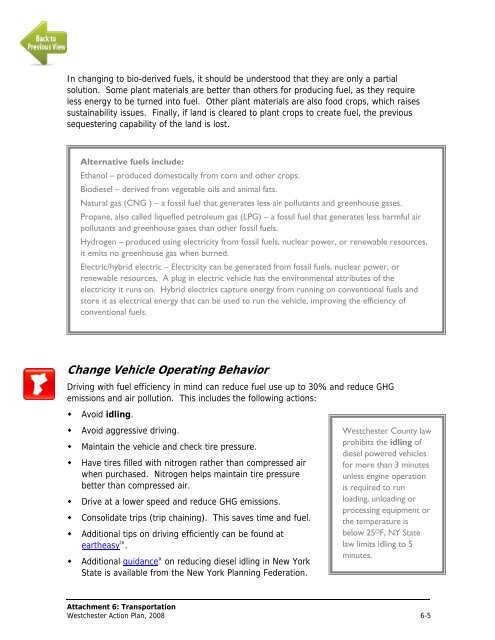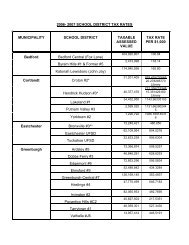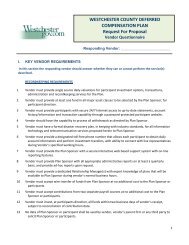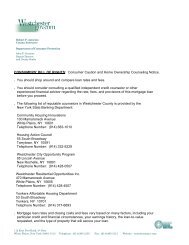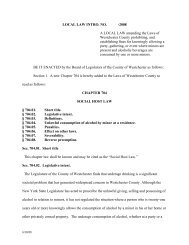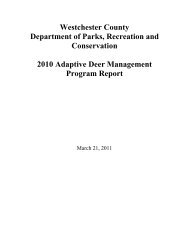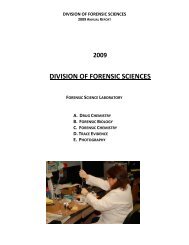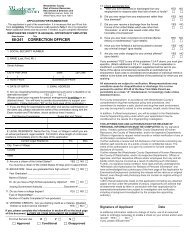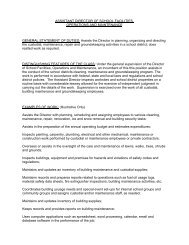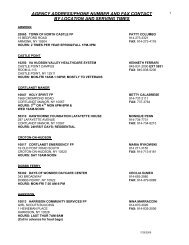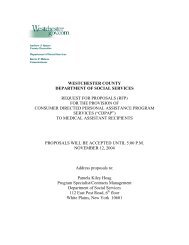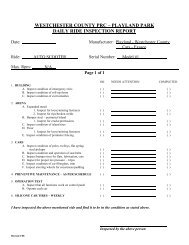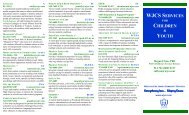Westchester Action Plan, 2008 - Westchester County Government
Westchester Action Plan, 2008 - Westchester County Government
Westchester Action Plan, 2008 - Westchester County Government
Create successful ePaper yourself
Turn your PDF publications into a flip-book with our unique Google optimized e-Paper software.
In changing to bio-derived fuels, it should be understood that they are only a partial<br />
solution. Some plant materials are better than others for producing fuel, as they require<br />
less energy to be turned into fuel. Other plant materials are also food crops, which raises<br />
sustainability issues. Finally, if land is cleared to plant crops to create fuel, the previous<br />
sequestering capability of the land is lost.<br />
Alternative fuels include:<br />
Ethanol – produced domestically from corn and other crops.<br />
Biodiesel – derived from vegetable oils and animal fats.<br />
Natural gas (CNG ) – a fossil fuel that generates less air pollutants and greenhouse gases.<br />
Propane, also called liquefied petroleum gas (LPG) – a fossil fuel that generates less harmful air<br />
pollutants and greenhouse gases than other fossil fuels.<br />
Hydrogen – produced using electricity from fossil fuels, nuclear power, or renewable resources,<br />
it emits no greenhouse gas when burned.<br />
Electric/hybrid electric – Electricity can be generated from fossil fuels, nuclear power, or<br />
renewable resources. A plug in electric vehicle has the environmental attributes of the<br />
electricity it runs on. Hybrid electrics capture energy from running on conventional fuels and<br />
store it as electrical energy that can be used to run the vehicle, improving the efficiency of<br />
conventional fuels.<br />
Change Vehicle Operating Behavior<br />
Driving with fuel efficiency in mind can reduce fuel use up to 30% and reduce GHG<br />
emissions and air pollution. This includes the following actions:<br />
• Avoid idling.<br />
•<br />
•<br />
•<br />
Avoid aggressive driving.<br />
Maintain the vehicle and check tire pressure.<br />
Have tires filled with nitrogen rather than compressed air<br />
when purchased. Nitrogen helps maintain tire pressure<br />
better than compressed air.<br />
<strong>Westchester</strong> <strong>County</strong> law<br />
prohibits the idling of<br />
diesel powered vehicles<br />
for more than 3 minutes<br />
unless engine operation<br />
is required to run<br />
• Drive at a lower speed and reduce GHG emissions.<br />
loading, unloading or<br />
processing equipment or<br />
• Consolidate trips (trip chaining). This saves time and fuel. the temperature is<br />
• Additional tips on driving efficiently can be found at<br />
eartheasy ix .<br />
• Additional guidance x on reducing diesel idling in New York<br />
State is available from the New York <strong>Plan</strong>ning Federation.<br />
below 25OF, NY State<br />
law limits idling to 5<br />
minutes.<br />
Attachment 6: Transportation<br />
<strong>Westchester</strong> <strong>Action</strong> <strong>Plan</strong>, <strong>2008</strong> 6-5


